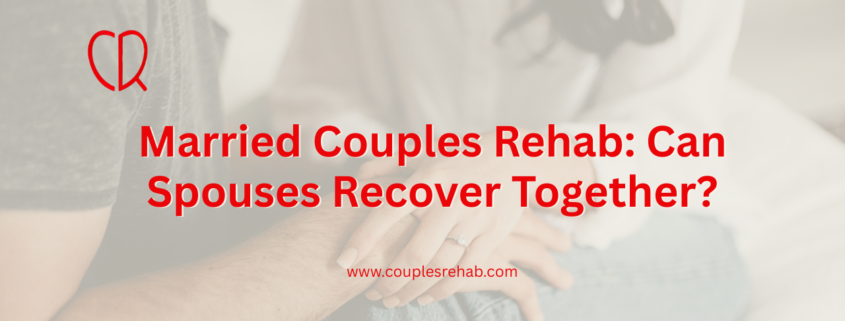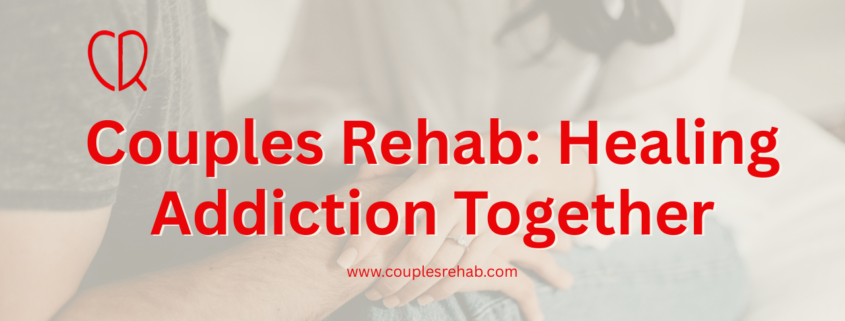The journey through substance abuse often becomes a shared struggle, leading many couples to wonder whether facing recovery together might be the most effective path forward. At Couples Rehab in Huntington Beach, we’ve witnessed firsthand how treating partners simultaneously can transform not just individual lives but the relationship itself. According to the Substance Abuse and Mental Health Services Administration, approximately 24.6 million Americans live with a spouse who has a substance use disorder. This statistic underscores the widespread need for treatment options that address the unique dynamics of married couples facing addiction together.
Understanding Couples Rehabilitation
Couples rehabilitation represents a specialized approach to addiction treatment that recognizes the profound interconnection between partners. Unlike traditional individual-focused programs, couples rehab treats the relationship as an integral part of the recovery process.
Rehab centers that accept married couples with addiction problems like ours operate on the principle that healing the relationship can significantly enhance individual recovery outcomes. This approach doesn’t replace individual therapy but rather complements it with joint sessions, relationship skill-building, and mutual accountability frameworks.
The philosophy stems from decades of research showing that relationship factors can either sabotage or support recovery efforts. By bringing both partners into treatment simultaneously, the harmful patterns that may have enabled substance use can be identified and transformed into recovery-supporting behaviors.
Benefits of Couples Attending Rehab Together
The decision to pursue rehabilitation as a couple offers several evidence-backed advantages that can enhance recovery outcomes for both partners while strengthening their relationship. Couples who undergo treatment together develop a common understanding of addiction and recovery concepts. This shared framework eliminates the isolation that often occurs when one partner undergoes treatment alone and returns to a spouse who doesn’t fully understand the recovery process.
Breaking Codependent Patterns Together
Many relationships affected by addiction develop codependent patterns that can undermine recovery. By participating in dual enrollment in addiction treatment for married couples, partners can identify these patterns together and work simultaneously on healthier interaction styles.
“We often see one partner taking on the caretaker role while the other becomes increasingly dependent,” explains Dr. Sánchez. “In joint therapy, both individuals can recognize how these roles have developed and practice new, healthier ways of relating.”
Enhanced Accountability
Partners in recovery together can provide day-to-day accountability in ways that treatment professionals cannot. This built-in support system extends the therapeutic environment beyond formal sessions.
One couple who completed our program shared: “Having my husband in treatment with me meant that we could remind each other of the techniques we were learning. When one of us was struggling, the other could often recognize warning signs before they escalated.”
Repairing Relationship Damage
Addiction typically causes significant relationship trauma, including broken trust, communication breakdown, and emotional distance. Couples rehabilitation provides structured opportunities to address these wounds while both partners are receiving professional support.
Building a Recovery-Supportive Relationship
Perhaps the most significant benefit is the transformation of the relationship itself into a recovery asset. Couples learn to create home environments and interaction patterns that support sobriety rather than trigger relapse.
Potential Challenges and Considerations
While couples rehab offers many benefits, it’s important to acknowledge the challenges of going to rehab with your spouse. Understanding these potential difficulties helps couples make informed decisions about whether joint treatment is right for their situation.
Different Recovery Paces
One common challenge is that partners often progress through recovery at different rates. “We remind couples that recovery isn’t a competition,” says Dr. Sánchez. “Each person has their own timeline and challenges, and comparing progress can create unnecessary tension.”
Our program addresses this by combining joint sessions with individual therapy tracks tailored to each person’s specific needs and recovery stage.
Relationship Distractions
Some couples find that relationship concerns can sometimes distract from individual recovery work. Particularly in early recovery, when emotional regulation is challenging, relationship tensions can trigger cravings or avoidance behaviors.
“We structure our program to create both togetherness and healthy separation,” explains Mark R. “This balance helps couples address relationship concerns without letting them overwhelm the critical individual recovery work.”
Privacy and Disclosure Concerns
Joint therapy necessarily involves sharing personal information that one or both partners might prefer to keep private. This tension between transparency and privacy requires careful navigation.
Our approach includes both joint and private individual therapy sessions, allowing each person space to process sensitive issues while still working toward relationship healing.
Codependency Reinforcement
Without skilled therapeutic guidance, couples rehabilitation could potentially reinforce unhealthy dependency patterns rather than resolve them. This risk makes professional expertise in both addiction and relationship dynamics essential.
Programs and Therapies for Couples
Couples drug rehab programs with individual therapy offer a multi-layered approach to treatment that addresses both relationship dynamics and individual recovery needs.
Behavioral Couples Therapy (BCT)
BCT represents the gold standard in evidence-based treatment for couples affected by addiction. This structured approach focuses on creating a recovery contract between partners, building communication skills, and increasing positive relationship behaviors.
Research published in the Journal of Marital and Family Therapy shows that BCT can reduce substance use more effectively than individual treatment alone while simultaneously improving relationship satisfaction.
Individual Therapy Components
While joint therapy forms the core of couples treatment, individual sessions remain crucial. These one-on-one meetings allow each partner to address personal trauma, mental health concerns, or aspects of addiction they might not feel comfortable exploring in joint sessions.
“The individual therapy component ensures that each person’s specific needs are met,” explains Jennifer Oakes. “Some issues require personal processing before they can be effectively addressed as a couple.”
Group Therapy Dynamics
Many couples benefit from participating in both couples-specific groups and traditional recovery groups. This combination provides peer support from others who understand relationship challenges in recovery as well as broader addiction insights.
“In our couples groups, partners often have breakthrough moments when they realize they’re not alone in their struggles,” notes Dr. Sánchez. “There’s something powerful about seeing other relationships healing from similar challenges.”
Family Systems Approach
Our program incorporates family systems therapy, which examines how family patterns influence addiction and recovery. This approach is particularly valuable for couples with children or those navigating complex extended family dynamics.

Addressing Codependency in Couples Treatment
Codependency represents one of the most common relationship patterns in marriages affected by addiction. Understanding how couples rehab addresses codependency issues is essential for successful long-term recovery.
Our approach begins with education about codependency, helping both partners recognize enabling behaviors, boundary issues, and unhealthy caretaking patterns. This awareness creates the foundation for change.
Treatment includes:
- Structured exercises to identify each partner’s role in maintaining addiction patterns
- Boundary-setting practice in a supportive environment
- Skills training for healthy emotional expression
- Gradual reduction of controlling or enabling behaviors
One former client shared: “I came to treatment thinking I was just being supportive, but I learned I was actually enabling his drinking. Learning to set boundaries felt terrifying at first, but it ultimately strengthened both his recovery and our marriage.”
Success Rates and Outcomes
Many couples considering joint treatment naturally wonder about the success rates for married couples in rehab together. While individual outcomes vary significantly based on multiple factors, research provides encouraging data.
A five-year follow-up study published in the Journal of Studies on Alcohol and Drugs found that couples who participated in Behavioral Couples Therapy showed significantly higher abstinence rates (58%) compared to individuals who received only individual treatment (28%).
At Couples Rehab, our internal outcome studies show that approximately 62% of couples who complete our full program maintain continuous sobriety for at least one year after treatment, with 71% reporting improved relationship satisfaction regardless of substance use outcomes.
Factors that influence success include:
- Length of treatment (longer programs generally yield better outcomes)
- Presence of co-occurring mental health conditions
- Degree of social support beyond the marriage
- Implementation of aftercare recommendations
- Each partner’s individual motivation for change
It’s worth noting that “success” in couples recovery often encompasses more than just abstinence. Many couples report significant life improvements even when perfect continuous sobriety isn’t achieved.
Special Considerations for Couples
Practical questions about logistics and intimacy frequently arise when couples consider rehabilitation together. One common question is whether married couples in rehab have conjugal visits or can share accommodations.
At Couples Rehab in Huntington Beach, we offer specialized housing options that allow couples to stay together while maintaining appropriate therapeutic boundaries. Unlike many traditional facilities that separate partners, our program recognizes that practicing new relationship skills in a real-world context can enhance treatment outcomes.
However, certain restrictions apply during early treatment phases. Our clinical team assesses each couple’s specific situation to determine appropriate boundaries regarding physical intimacy and private time. These decisions prioritize creating an environment that supports recovery rather than distracts from it.
Couples Treatment for Co-Occurring Disorders
The complexity of recovery increases substantially when one or both partners experience co-occurring mental health conditions alongside addiction. Alcohol rehab for spouses with co-occurring disorders requires a sophisticated integrated treatment approach.
According to the National Institute on Drug Abuse, approximately 37.9% of individuals with substance use disorders also have at least one serious mental health condition. This rate may be even higher among couples seeking treatment together, as mental health challenges often affect relationship dynamics.
Our dual-diagnosis program incorporates:
- Comprehensive psychiatric assessment for both partners
- Medication management when appropriate
- Therapy modalities specifically designed for conditions like depression, anxiety, PTSD, and bipolar disorder
- Education about the interaction between mental health and addiction
- Collaborative treatment planning that addresses both individual and relationship needs
Dr. Michael Chen, our consulting psychiatrist, notes: “When treating couples with co-occurring disorders, we must carefully consider how medications and therapeutic approaches might affect relationship dynamics. The goal is to support both mental health and relationship healing simultaneously.”
Couples Rehab in Huntington Beach
Our residential treatment for married couples with substance abuse in Huntington Beach, CA provides a unique healing environment that combines clinical excellence with the natural therapeutic benefits of our coastal location.
The Couples Rehab facility features:
- Private and semi-private accommodations for couples
- Comfortable therapeutic spaces for both individual and joint sessions
- Holistic treatment areas for complementary approaches like meditation and yoga
- Access to beach activities that support physical and emotional healing
- Family meeting spaces for sessions with children or extended family members
Our clinical team includes specialists in both addiction treatment and relationship therapy, ensuring comprehensive care that addresses the full spectrum of couples’ needs. Each treatment plan is customized based on initial assessments of both individual and relationship factors.
The Huntington Beach location offers several advantages for recovering couples, including:
- A mild climate that supports year-round outdoor recovery activities
- Distance from everyday triggers and stressors
- A recovery-friendly community with extensive aftercare resources
- Beautiful natural settings that facilitate healing conversations and reconnection
Affordability and Insurance
Concerns about cost often prevent couples from seeking the help they need. Understanding affordable rehab options for married couples in Huntington Beach, CA is an important step in treatment planning.
Most major insurance plans cover at least a portion of couples rehabilitation services, though coverage varies significantly between policies. Our admissions team works directly with insurance companies to maximize available benefits for both partners.
For couples without adequate insurance coverage, we offer:
- Sliding scale payment options based on financial need
- Payment plans to distribute costs over time
- Scholarship opportunities for qualifying couples
- Assistance identifying and applying for external financial aid resources
Investing in quality treatment often proves more economical than continuing to bear the financial burden of active addiction, which can include lost wages, legal costs, health complications, and relationship dissolution.
FAQs About Couples Rehabilitation
1. How long does couples rehab typically last?
The length of treatment varies based on several factors, including the severity of addiction, presence of co-occurring disorders, and individual progress. Our programs typically range from 30 to 90 days, with most couples benefiting most from at least 60 days of treatment. Research consistently shows that longer treatment durations correlate with better outcomes.
2. Can couples with different substances of choice be treated together?
Yes, our program successfully treats couples with different substances of addiction. The core principles of recovery and relationship healing apply regardless of substance, though certain aspects of treatment may be tailored to address specific substances. Each partner receives individualized care within the context of the joint program.
3. What happens if one spouse wants to leave treatment early?
This situation requires careful clinical handling. Our team works extensively with the couple to understand the reasons for wanting to leave and address underlying concerns. In some cases, the treatment plan may be modified to better meet the reluctant partner’s needs. If one partner ultimately decides to leave, we help both individuals develop appropriate plans based on their unique circumstances.
4. How does couples rehab handle situations where one partner has been pressured into treatment?
Motivation differences are common and addressable. Our approach includes motivational enhancement therapy specifically designed to help reluctant partners connect with their own reasons for change rather than simply complying with their spouse’s wishes. Over time, most initially reluctant participants develop genuine internal motivation.
5. Are children allowed to visit during couples rehab?
We offer structured family visitation programs that include children when clinically appropriate, typically after the initial stabilization period. These visits are therapeutically facilitated to support healthy family healing. For couples with children, we also provide specialized parenting-in-recovery education.
6. How are pre-existing mental health medications handled during couples treatment?
Our medical team conducts comprehensive evaluations of all current medications for both partners. Prescribed psychiatric medications are typically continued and monitored throughout treatment, with adjustments made as necessary based on how they interact with recovery and relationship work.
7. What happens after the residential portion of couples rehab ends?
Comprehensive aftercare planning is an integral part of our program. Most couples transition to structured outpatient treatment while implementing their newly learned skills at home. Aftercare plans typically include ongoing couples therapy, individual counseling, support group participation, and regular check-ins with our aftercare coordinator.
8. How are relapse risks addressed for couples in recovery together?
Our program includes extensive relapse prevention planning specifically designed for couples. This includes identifying relationship-specific triggers, developing joint prevention strategies, and creating clear protocols for how partners can support each other if warning signs emerge. We also address the complex dynamics that arise if one partner relapses while the other remains sober.
9. Is couples rehab appropriate if domestic violence has occurred in the relationship?
Safety takes absolute priority in our assessment process. When a history of domestic violence exists, we conduct thorough evaluations to determine whether joint treatment is appropriate. In some cases, we recommend separate treatment initially, with carefully structured couples work integrated later if safety can be ensured. In other situations, separate treatment paths may be the safer recommendation.
10. What makes Couples Rehab in Huntington Beach different from standard rehabilitation programs?
Unlike traditional programs that either separate couples entirely or offer limited couples sessions within an individual framework, our program is specifically designed around the relationship as the primary context for healing. Every aspect of treatment—from initial assessment through aftercare planning—integrates both addiction recovery and relationship healing. Our specialized staff, couple-focused facilities, and decades of experience with couples specifically set us apart in the treatment landscape.
Conclusion
The journey through addiction and into recovery represents one of the most significant challenges a marriage can face. While not every couple benefits from attending rehab together, many find that joint treatment offers unique advantages for both individual recovery and relationship healing.
At Couples Rehab in Huntington Beach, we’ve witnessed remarkable transformations as partners learn to support rather than enable, communicate rather than withdraw, and heal both individually and as a couple. The path isn’t always easy, but with professional guidance, couples can not only overcome addiction but emerge with stronger, healthier relationships than before.
If you’re considering couples rehabilitation, we invite you to reach out for a confidential consultation to explore whether our approach might be right for your situation. Recovery happens one day at a time, but you don’t have to walk that path alone.
For more information or to schedule an assessment, contact Couples Rehab in Huntington Beach.



